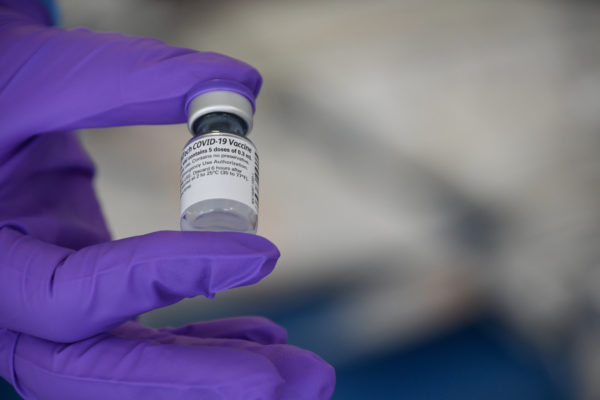
(COVID-19 vaccine, Manatee Country Government/Flickr)
by Rachel Ansley
In order to enhance the equity and effectiveness of COVID-19 vaccination campaigns in developing countries, global leaders must enact an international initiative promoting civil society involvement and citizen engagement in vaccine distribution.
The need to vaccinate the world’s population against COVID-19 has spurred a global movement on a scale seen only once before—in the response to the pandemic itself. National and international COVID-19 response programs disbursed billions of dollars for emergency relief necessarily rapidly, but also with little oversight. Transparency and accountability in these responses is acknowledged by all as important for protecting vulnerable populations and saving lives, but such an approach has proven challenging. As the global community switches gears to once again mobilize coordinated campaigns, this time for vaccine distribution, it is imperative that leaders and key actors apply lessons learned during the initial phases of pandemic response to ensure good governance and inclusivity of the vaccination programs.
Civil society organizations (CSOs) have proven effective at improving the implementation and governance of development programs when their support is welcomed by local authorities. Over the course of the pandemic, CSO partners working with the Partnership for Transparency (PTF) to implement programs monitoring government COVID-10 response programs demonstrated the essential value-add of grassroots efforts within the context of top-down work. In particular, they have improved COVID-19 response programs in the following areas that can be scaled and applied to vaccination campaigns:
- Communication and Raising Awareness – SAVE-Ghana created a new local radio show to answer citizens’ questions about COVID-19 and service delivery, while also addressing their fears in a culturally appropriate and relevant manner. Youth for Social Development (YSD) in India raised local awareness of hygiene, testing, and social protection measures.
- Distribution and Service Delivery – The Centre for Advocacy and Research (CFAR) in India provided emergency relief such as food and hygiene kits for migrant workers stranded far from home, while also connecting them to local social safety nets.
- Procurement – The Anti-Corruption Coalition Uganda (ACCU) procured smartphones for local healthcare workers to help provide weekly updates on the management of the pandemic and helped improve implementation of response measures.
- Monitoring and Auditing – Poder Ciudadano in Argentina has created a national observatory, supplemented by a Risk Map, comprised of open-source information and designed to monitor disbursement of government funds for pandemic relief efforts. It is planning to apply this monitoring work to vaccine distribution, tracking funds and supplies from the government to the ground level.
- Advocacy and Grievance Redress – ACCU organized engagements with officials at Wakiso District Local Government and the Ministry of Health to disseminate findings from their monitoring reports. This sustained pressure resulted in the Ministry of Health releasing information related to the management of COVID-19 funds.
Where CSOs played a role in COVID-19 response and engaged citizens in their monitoring efforts, government programs were implemented with a greater degree of transparency and efficiency, thereby increasing public trust in the resources offered to them. In order to achieve this degree of efficacy, CSO engagement must be supported by the government. Government institutions can create a positive environment for CSOs by inviting them to complement government efforts in mutually agreed areas, share information with civil society, and allocate a fraction of the COVID-19 response money to fund their work.
It is imperative that vaccine distribution campaigns take a similar approach to involving citizens and civil society, ensuring that widespread global response efforts reach the individuals who need this assistance most.
The key challenges to effective COVID-19 vaccination programs include:
- Effective communication – accurate and timely information to boost demand
- Equitable distribution – ensuring delivery to all, especially vulnerable populations
- Last-mile delivery – outreach to distant, mobility-impaired, and vaccine hesitant groups
- Trust in government – overcoming citizen reluctance to vaccinations promoted by officials
- Transparent and corruption-free delivery of vaccination services and supply-chain items
Civil society and citizen engagement can help address all of these challenges by complementing the efforts of government authorities, particularly at the community level. They can do so by selective and context-sensitive interventions in the following programmatic areas:
- Assist in community outreach to educate, dispel misinformation, and influence behaviors
- Assess the extent of and main reasons for vaccine hesitancy, then design and deliver tailored messages to overcome them
- Identify those who are vulnerable to missing vaccinations due to demand barriers (e.g., mobility, language, identity, remoteness, etc.), and act to overcome the barriers
- Monitor compliance with vaccine allocation criteria, identify and closing vaccine service delivery gaps, and administer vaccines when authorized
- Monitor integrity in procurement/distribution of components in vaccine supply chain
- Work with budget, audit, and anti-corruption agencies using participatory methods
Implementation plans for vaccination campaigns should specify CSO engagement activities from the aforementioned list, terms of reference, funding, procurement methods, and disclosure of the plans. In addition, these plans require not only adequate funding, but also a flexible, speedy, non-bureaucratic funding mechanism for trusted, local CSOs. Therefore, a large-scale initiative to fund community and citizen engagement in vaccination programs is needed.
While the value of citizen engagement is generally understood, the global response to COVID-19 has demonstrated that civil society and community involvement is not merely beneficial, but essential for equitable and transparent relief efforts. By applying lessons learned from the first wave of pandemic response to vaccine distribution campaigns, and involving citizens and civil society in their implementation, global leaders can ensure the maximum impact of their efforts.
To learn more about how PTF has supported civil society engagement in COVID-19 monitoring, and to follow along with future developments, follow us on Twitter @PTFund and on Facebook, Partnership for Transparency – PTF.

